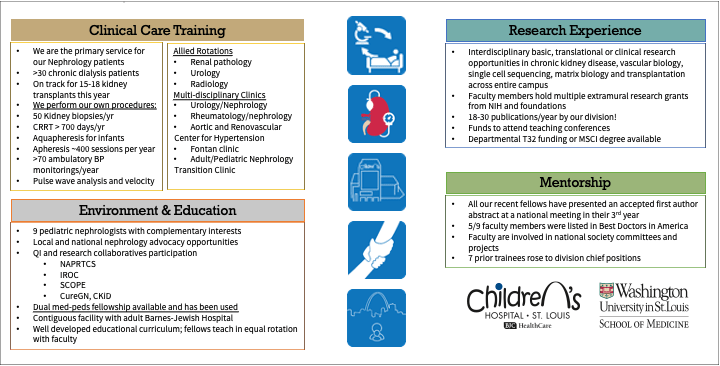The division has an active pediatric nephrology fellowship program designed to train sub-specialist pediatricians for academic careers. Clinical responsibilities are concentrated in the first year of the three-year fellowship. Fellows will manage a wide variety of patients with glomerular diseases, tubular disorders, congenital anomalies of the kidneys and urinary tract, hereditary kidney diseases, hypertension, acute kidney injury, chronic kidney disease, end-stage kidney disease, and other conditions. The fellow will follow their own cohort of patients in the outpatient clinic. They will be exposed to and learn to prescribe hemodialysis, peritoneal dialysis, continuous renal replacement therapy, modified aquapheresis, and apheresis for a variety of clinical scenarios.
Opportunities for both clinical and basic science research in years two and three are available through divisional research and through the outstanding faculty of Washington University in St. Louis School of Medicine. Efforts are made to carefully place each fellow into a thriving research environment appropriate to his/her background and interests to optimize success. Several of our recent fellows are in or have successfully completed: a) dual Med-Peds nephrology fellowship; or b) fast-track residency program into fellowship; or c) a Masters in Clinical and Translational Science research.
Research training in the division focuses on several areas of nephrology: renal development, glomerular diseases, genetics, hypertension, chronic kidney diseases, and complications in pediatric dialysis patients and kidney transplant recipients. Translational studies of new therapies for kidney diseases have emerged from projects led by fellows.
A recent fellow translational project looked at the association of APOL1 high-risk alleles in primary hypertension or glomerular diseases in African-American children. Bench discoveries in the Hruska lab regarding pathophysiology of CKD have included the demonstration that chronic kidney disease directly diminishes skeletal anabolism by inhibiting the function of the BMP and Wnt proteins. Mechanisms of signal transduction through these pathways are current investigational pursuits under the fellowship training program at the present time. In addition, active research programs related to phosphorus, vascular calcification and their cardiovascular complications are available along with new therapeutic approaches to these disorders.
Clinical and translational research in transplantation looks at the impact of complications such as post-transplant infections, malignancies and mineral disorders in chronic rejection. Ongoing studies by fellows or faculty members are investigating autoantibody development or vascular calcification measures. Other recent studies have assessed aortic stiffness in patients with hypertension, beta-2 microglobulin in diagnosis of acute kidney injury.
In addition, division faculty actively participate in multi-center studies through NAPRTCS, PNRC, SCOPE, GLEAN, CKiD, AWARE, AWAKEN, and IROC.
Pediatric nephrology fellowship highlights

Conference schedules
| Monday | pediatric nephrology conference |
|---|---|
| Tuesday | nephrology research seminar |
| Wednesday | adult pathophysiology conference |
| Thursday | adult clinical case conference |
| Friday | pediatric nephrology conference |
Radiology Urology Nephrology (RUN) conference once every six weeks


